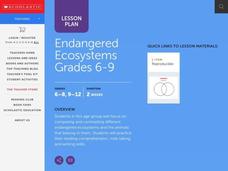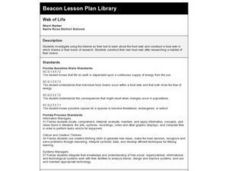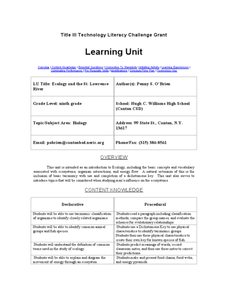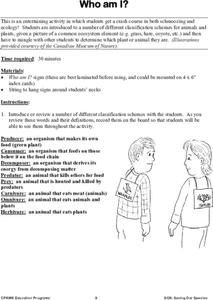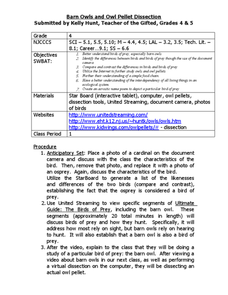Chicago Botanic Garden
Leaf Litter Ecology Lab
Some organisms spend their entire lives in leaf litter. The third in a series of six is a great lesson exploring the community of leaf litter. Groups gather and then spread leaf litter over white paper and remove leaves/twigs while...
Curated OER
Endangered Ecosystems
Reading comprehension and note-taking skills are practiced as young ecologists embark on this journey. Explorers visit a website where they will read about three ecosystems that are in danger. They use interactive programs to build a...
National Wildlife Federation
Spider Sensations
Know that feeling when walking into a spider's web? Feel it from the other end! Scholars learn about the body parts of a spider and the specific spiders known as orb-weavers. Groups play a game to figure out how a spider finds its food...
Curated OER
Collecting Compost
Students observe a composting box. For this soil lesson, students create a composting bin by using a bin, newspaper, worms, and food scraps. Students create a composting food web.
Curated OER
Lesson 9 - Along Our Coast
Learners study the benefits of estuaries. They construct a saltwater food web, and complete worksheets and a quiz.
Curated OER
Web of Life - Alaska
Seventh graders research Alaska, then construct their own food web after researching a habitat of their choice.
Curated OER
Food Chains and Webs
Students identify the organisms found near their school or house and observe them. In this food chain lesson students examine how an organism gets their energy and then fill in a chart to create a food web with the organisms they listed.
Curated OER
Marine & Aquatic Habitats Activities - Terrestrial Forests vs. Kelp Forests
Students discuss concept and specificity of habitats, both marine and terrestrial, list similarities and differences in the habitats of a kelp forest and a terrestrial forest, compare types of organisms that occupy corresponding types of...
Curated OER
Jeopardy 8th Grade (Science)
There are so many topics touched upon in this Jeopardy-style science game, that it is difficult to classify! The categories include electricity, matter, ecology, earth and space, and scientific investigation. This would best be used at...
Curated OER
Forest Ecology
Students examine the different plants and animals in British Columbia. In this forest ecology lesson students explore how ecosystems work, classify animals and investigate food webs and chains.
Curated OER
Who's Coming to Dinner?
Students identify the role predators/prey play in food chains, differentiate between food chains and webs, identify factors that affect the balance in food webs, and propose solutions to protect endangered species' environments and...
Curated OER
Ecology and the St. Lawrence River
Ninth graders complete a unit of lessons on ecosystems, organism interactions, and energy flow. They create a key for known species of fish, diagram the movement of energy through an ecosystem, and create and present food chains and food...
Curated OER
Genetically Modified Foods in Perspective
Students research the concept of genetically modified foods. The purpose of the research is to increase science content knowledge and comprehension of the controversy surrounding the subject.
Curated OER
Impact of Invasive Species on Food Webs and Ecosystems
Fifth graders explore how invasive species affect the Great Lakes. In this science lesson, 5th graders research invasive species and create a food chain involving the invasive species. Students discuss how the environment is affected by...
Curated OER
The Food Web
Students explore the role that the Arctic hare plays in the Canadian Arctic food web.
Curated OER
Cavern Life: The Food Web
Pupils explain the importance of elements on a food web. They realize that without light there can be no life. They perform various activities based on grade level.
Curated OER
Putting the Pieces Together
Students, in groups, explore ecosystems, water cycle, rock cycle, and food web. They create a puzzle piece on white butcher paper based on their information.
Curated OER
Profiling the Enemy
Tenth graders examine different invasive species in Lake Michigan. In this biology lesson plan, 10th graders research how these species get into the lake and how they survive there. They analyze their effect on the food web and existing...
Curated OER
Who Am I?
Students classify organisms into one of five categories: producer, consumer, decomposer, predator, or prey. Students play a "Who Am I" game. Signs are hung on the backs of fellow students They must ask questions to determine what...
Curated OER
Farming: It's a Fact
Understanding where our food and textiles come from is key to understanding business, economics, and the importance of modern agriculture. Learners play a game, read text to determine farm fact from opinion, and itemize a grocery receipt...
National Park Service
The Secret of Life
Dead trees provide nutrients for the soil, food for animals, protection and a home for organisms, a seed-bed for new trees, and a place for nitrogen-fixing bacteria to live. In the activity, pupils collect decaying logs, expose them to a...
Curated OER
The Frog and the Ol' Black Fly
Students explore frogs. In this cross curriculum literacy and frogs lesson, students predict the plot and then listen to the book The Wide-Mouthed Frog by Keith Faulkner. Students define "predator" and identify foods a frog might eat. ...
Curated OER
Barn Owls and Owl Pellet Dissection
Students explore birds of prey and food chains. In this ecosystems and birds of prey cross curriculum science and literacy lesson, students brainstorm characteristics of birds after viewing photographs. Students view a video and document...
NASA
Producers Make Their Own Food
During an inquiry-based lesson, scholars decide which variable to test and then design an experiment to determine the needs of producers. After two weeks, they complete a full analysis and research paper.



